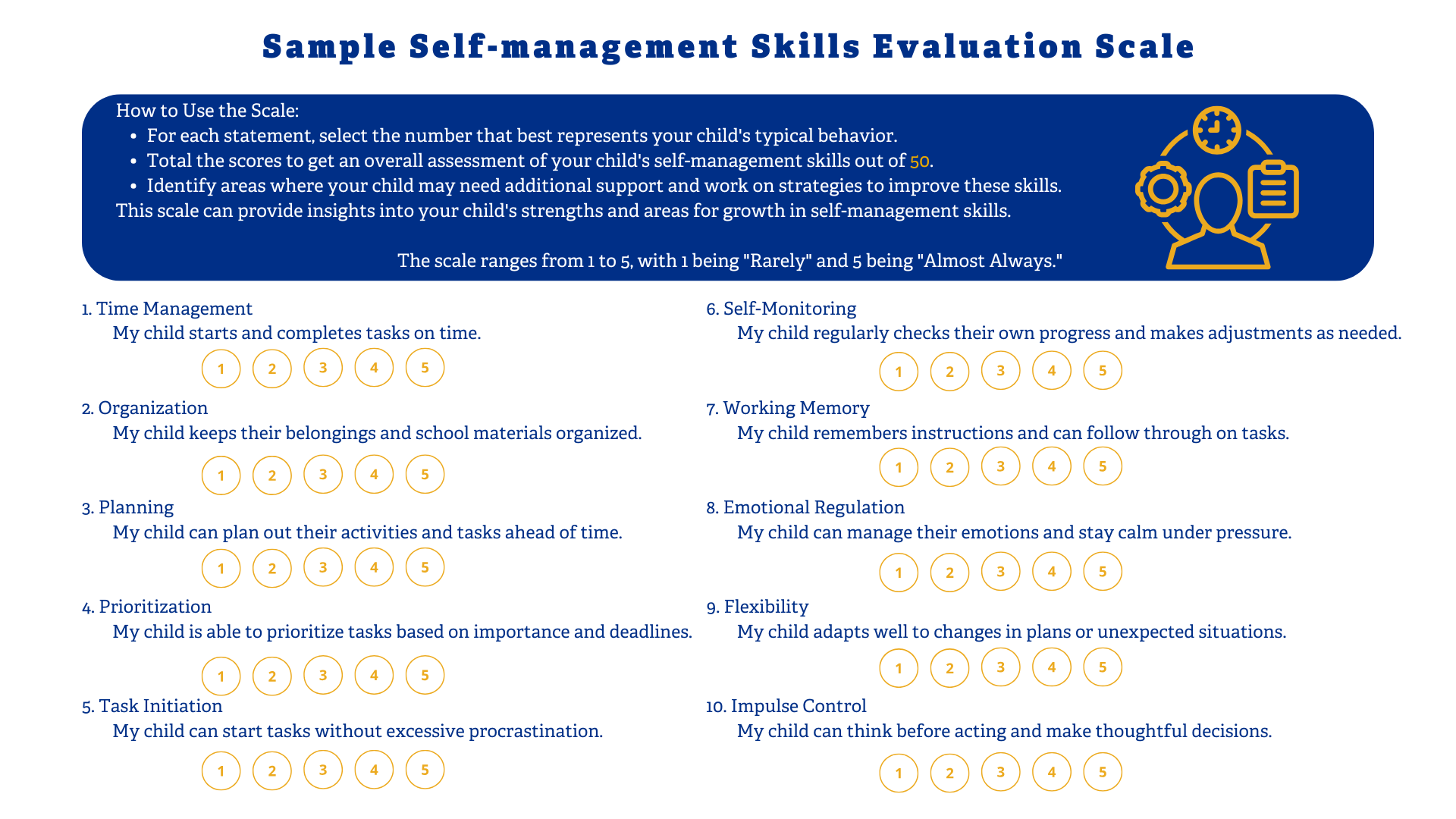

In today’s fast-paced world, self-management skills are more crucial than ever for children to thrive academically and personally. Strong executive functioning skills help students manage time effectively, stay organized, regulate emotions, and complete tasks independently.
The sample Self-Management Skills Evaluation Scale shown in the image above offers a structured framework for parents to evaluate their child’s self-discipline, organization, and adaptability. With a rating system from 1 to 5, this scale provides valuable insights into strengths and areas needing extra support.
In this blog, we’ll explore each skill in depth, explaining why it matters and providing actionable strategies for parents to help children develop better self-management habits.
What Are Self-Management Skills?
Self-management skills, often linked to executive functioning, refer to a child’s ability to:





When children struggle with self-management, they may have difficulty with time management, organization, and maintaining focus, which can lead to missed deadlines, forgotten assignments, and increased frustration.
By using the sample Self-Management Skills Evaluation Scale, parents can pinpoint areas where their child excels and where they may need additional guidance.
Breaking Down the Self-Management Skills Evaluation Scale
The evaluation scale measures 10 core self-management skills that are essential for academic success and personal growth. Here’s a closer look at each one:
1. Time Management
Key Question: Does my child start and complete tasks on time?
Time management is critical for academic performance and life skills. Children who manage their time well:



Tips for Parents:
- Use a visual schedule or planner to map out tasks.
- Teach the Pomodoro technique (25-minute focused study sessions).
- Encourage goal-setting and tracking progress.
2. Organization
Key Question: Does my child keep their belongings and school materials organized?
Organization skills affect both academic performance and daily life. A well-organized child:



Tips for Parents:
- Create a designated study space free from distractions.
- Teach the use of binders, folders, and checklists.
- Encourage a 5-minute tidy-up habit at the end of each day.
3. Planning
Key Question: Can my child plan their activities and tasks ahead of time?
Effective planning helps children break down large assignments into manageable steps.
Tips for Parents:
- Use weekly planners or to-do lists.
- Teach backward planning (start from the due date and work backward).
- Help them break big projects into small, achievable goals.
4. Prioritization
Key Question: Can my child prioritize tasks based on importance and deadlines?
Prioritization helps children determine which tasks need attention first. Without this skill, they may spend too much time on less important activities, leading to unfinished work and stress.
Tips for Parents:
- Teach the Eisenhower Matrix (urgent vs. important tasks).
- Encourage them to write down tasks in order of priority.
- Set realistic deadlines for each step of a project.
5. Task Initiation
Key Question: Can my child start tasks without excessive procrastination?
Procrastination is a common challenge for students. Kids who struggle with task initiation often delay work due to a lack of motivation or feeling overwhelmed.
Tips for Parents:
- Use the 5-minute rule: Encourage starting a task for just five minutes.
- Reduce distractions like social media and TV during study time.
- Offer positive reinforcement when they begin tasks on time.
6. Self-Monitoring
Key Question: Does my child regularly check their progress and make adjustments?
Self-monitoring helps children reflect on their work and adjust their approach if needed.
Tips for Parents:
- Encourage self-reflection: Ask, “How do you think you did? What could you improve?”
- Teach them to review their work before submission.
- Help them set personal benchmarks for progress.
7. Working Memory
Key Question: Can my child remember instructions and follow through on tasks?
Strong working memory helps children retain and apply information efficiently.
Tips for Parents:
- Break instructions into smaller, step-by-step tasks.
- Encourage the use of mnemonics or memory aids.
- Have them repeat back instructions to ensure understanding.
8. Emotional Regulation
Key Question: Can my child manage their emotions and stay calm under pressure?
Children who struggle with emotional regulation may have difficulty handling stress, frustration, or disappointment.
Tips for Parents:
- Teach deep breathing and mindfulness techniques.
- Encourage positive self-talk (e.g., “I can handle this!”).
- Help them recognize and label their emotions.
9. Flexibility
Key Question: Does my child adapt well to changes in plans or unexpected situations?
Flexibility is essential for problem-solving and resilience. Kids with rigid thinking may struggle with change.
Tips for Parents:
- Introduce “What if?” scenarios to encourage adaptive thinking.
- Model calm problem-solving when plans change.
- Teach the importance of Plan B for unexpected situations.
10. Impulse Control
Key Question: Can my child think before acting and make thoughtful decisions?
Impulse control helps children avoid acting on immediate urges and instead make rational decisions.
Tips for Parents:
- Teach the “Pause and Think” strategy before responding.
- Practice role-playing exercises to develop decision-making skills.
- Encourage delayed gratification (e.g., waiting to buy a toy).
Final Thoughts: Empowering Children with Strong Self-Management Skills
Using the sample Self-Management Skills Evaluation Scale, parents can identify strengths and target areas for growth. Developing these executive functioning skills will help children succeed academically, socially, and emotionally.
By implementing small, consistent strategies, parents can set their children up for long-term success in school and beyond.
